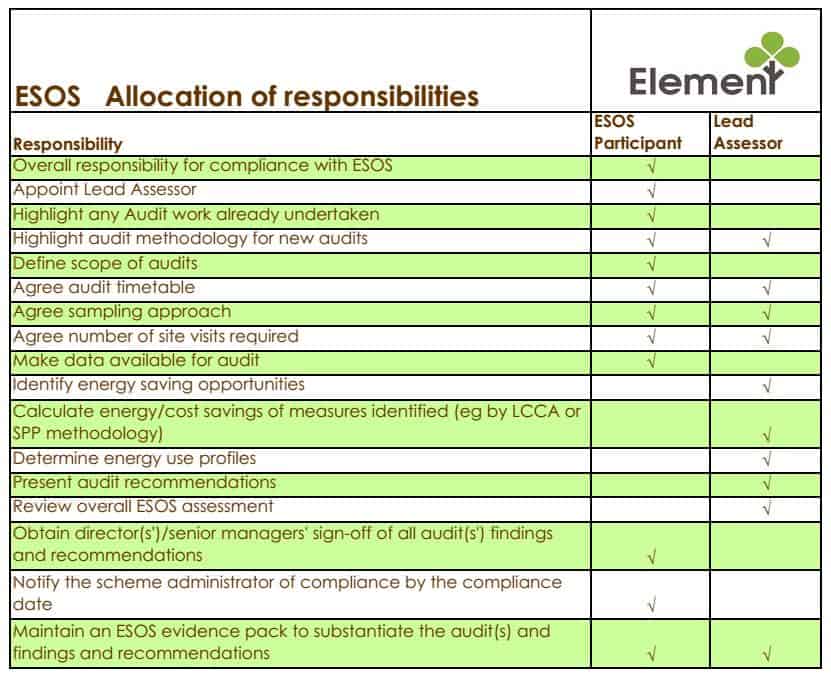Resource Efficiency
Element are a Lead Assessor under the Energy Savings Opportunity Scheme (ESOS) so we understand the process of collating information to quantify your entity’s total energy use, and the processes you can use to reduce your total energy use.
We cover all resources, electricity, oil, gas and water and have methodologies to suit each.
Electricity studies would include use for principally heating, lighting, refrigeration and cooling. A lighting survey would identify opportunities for low-energy lighting if not already adopted. This would also include the identification of opportunities to deploy renewable technologies.
Oil use is usually for heating and we would evaluate improvements or alternatives
Water studies will inevitably include a mass balance study to identify opportunities to improve the efficiency of water usage with a view to reducing the quantity going to sewer as sewerage costs often make up the major part of water costs.
Gas studies will involve assessment of improvement opportunities.
We are happy to study any or all of the resources you consume.
We actively work with Facilities Management companies and Energy Service providers to help them assist their clients with optimising their resource usage.
We have been on the Invest Northern Ireland Sustainability framework for a number of years and during that time we have carried out a large numbers of audits for INI clients.
These have covered every resource from energy to water and are always accompanied with a comprehensive analysis and a clearly costed set of recommendations.
We have worked with clients from large (NI Water, Michelin) to small and understand how to make energy work efficiently for your business.
The disposal of waste costs a lot of money, be it animal slurries, scrap timber or industrial process waste eg starch. This cost of disposal now makes it desirable to find methods of reducing the amount of waste which goes for disposal. Finding ways to use the waste to generate energy or reduce its quantity is the goal.
The management of waste breaks down into a number of related activities:
- Minimising the generation of waste using a range of process engineering techniques and/or recycling
- Efficient handling of unavoidable waste
- Finding alternative uses for waste
eg Energy from Waste Biomass Power Stations
Anaerobic Digestion of highly Organic waste
Finding alternative uses for the end products
We have extensive experience of all of these areas from designing EFW Power plants, to Slurry aeration systems to accelerate aerobic digestion, to alternative uses.
The UK Energy Savings Opportunity Scheme
Element Consultant – Approved lead assessor for ESOS
https://elementconsultants.co.uk/hmgov-esos-guide-lit_10094/
Element Consultants have an approved ESOS Lead Energy Assessor and can manage all your ESOS responsibilities. We have guided a number of organisations through Phase 1 of ESOS accreditation and help your business.
ESOS is the mechanism by which all UK businesses will be compelled to comply with Article 8 of The EU Energy Efficiency Directive.
In the first phase only large businesses had to engage. These businesses should have completed their first compliance period by 5th December 2015. They then have to submit further compliance notices on a four-yearly frequency as shown in the table:
Phase 2
We are now in Phase 2 which has a deadline of 5th December 2019. Companies now have to submit the first of further compliance notices. The data preparation period for Phase 2 started on the 1 January 2018.
What is a large business?
Employees > 250
Turnover > €50 million (£38,937,777) and a balance sheet in excess of €43 million (£33,486,489)*
* Based on Euro:Stg spot rate at 31/12/14
This will include:
Public sector bodies, Universities, not-for-profit groups etc. , where not excluded.
Element can advise you on your compliance responsibilities and guide you through the process.
The spirit of the Directive however, is to embed an energy efficiency ethos into your organisation.
We have been doing just that at Element Consultants for the last 8 years.
If you are unsure whether you comply you can read the government guidance.
What does ESOS entail?
ESOS assessments are audits of all energy used by an organisation; this includes buildings, industrial processes and transport. They specifically include the identification of cost-effective energy saving measures.

How to comply:
– You must appoint a Lead Energy Assessor
– You total energy consumption must be calculated using approved methods
– Significant areas of consumption (accounting for 90% of energy use) must be identified
– Energy-saving measures to minimise consumption must be identified
The Assessment must be approved and signed off by the appointed Lead Energy Assessor
– The relevant compliance body must be notified.
Although the Environment Agency has UK-wide responsibility, the scheme is managed locally.
ESOS Roles

Element have an accredited Lead Energy Assessor and can guide you through this process – why not contact us?
